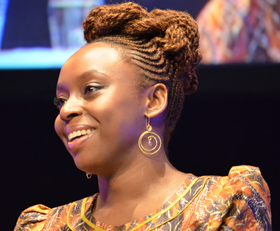
Ifemelu, the main character in Chimamanda Ngozi Adichie’s novel Americanah, writes a blog about race in America. Ifemelu, like Adichie, is Nigerian. When she was growing up in Nigeria, she never thought much about race—because she never had to. When she came to the United States for her college education, however, that changed. As a black person in a majority white country, she is forced to think about the color of her skin because it shapes the way others define her.
While in the U.S., Ifemelu learns not only about the racial tensions between American whites and blacks, but also about the tensions between American blacks and Africans. She observes that the experiences of African-Americans differ markedly from the experiences of African-Americans (newly arrived immigrants from Africa.) The way blackness plays out in the U.S. intrigues Ifemelu so much that she starts to write a blog about it, a blog that becomes wildly successful.
Many of her sharp, insightful blog posts are reproduced in the novel and serve as a commentary on what Ifemelu and the people in her lives are experiencing. For example, in this post, Ifemelu advises her readers (tongue-in-cheek) on the proper tone to adopt when discussing racial injustices:
I”f you’re telling a non-black person about something racist that happened to you make sure you are not bitter. Don’t complain. Be forgiving. If possible, make it funny. Most of all, do not be angry. Black people are not supposed to be angry about racism. Otherwise, you get no sympathy. This applies only for white liberals, by the way. Don’t even bother telling a white conservative about anything racist that happened to you. Because the conservative will tell you that YOU are the real racist and your mouth will hang open in confusion.” (223)
This post is most obviously a commentary on the experiences faced by black characters in Americanah. Black people in America are not allowed to be angry about racism because it makes white people uncomfortable. The stance of this blog post also, however, echoes the tone Adichie adopts in Americanah. Both Adichie’s and Ifemelu’s tone when it comes to race is sharp, sometimes even withering. At the same time, though, it is funny (at times) and warm enough not to veer too far into the tone angry bitterness that scares away so many white people. Adopting the right tone so that a black author can reach a large audience of white people in order to chastise them about their racism is no easy feat. Adichie, I believes, succeeds at this difficult maneuver.
I say this, in case it is not obvious, as a white reader. I am, in fact, one of those white liberal readers who is the target of many of Adichie’s most satirical jabs. For example, Adichie’s white employer Kimberly tries so hard to be non-racist that when she is around Ifemelu, she coos over photos of ordinary-looking black women:
“Kimberly said, “Oh, look at this beautiful woman,” and pointed at a plain model in a magazine whose only distinguishing feature was her very dark skin. “Isn’t she just stunning?”
“No, she isn’t.” Ifemelu paused. “You know, you can just say ‘black.’ Not every black person is beautiful.”
Kimberly was taken aback, something wordless spread on her face and then she smiled, and Ifemelu would think of it as the moment they became, truly, friends.” (149)
Scenes like this, describing well-meaning yet ignorant displays of the racial divide in this country, make me question myself. Am I as silly and short-sighted as these white characters when it comes to race? If so, what can I do to be different, to take a small step towards improving the sad state of racial relations in this country?
Adichie does not provide any simple answers to this question, nor should she be expected to do so. She does, however, give this piece of advice:
“So after this listing of don’ts what’s the do? I’m not sure. Try listening, maybe. Hear what is being said. And remember that it’s not about you. American Blacks are not telling you that you are to blame. They are just telling you what is. If you don’t understand, ask questions. If you’re uncomfortable about asking questions, say you are uncomfortable about asking questions and then ask anyway. It’s easy to tell when a question is coming from a good place. Then listen some more. Sometimes people just want to feel heard. Here’s to possibilities of friendship and connection and understanding. ” (328)
This advice to “listen” seems so commonsensical, it is sad to think it has to be said. Yet I think it does. Maybe if we would also listen (or read) more and argue (defensively) less, we could make some progress. Here’s to possibilities of listening—and friendship and connection and understanding.
—-
This post is part of the Africa Reading Challenge hosted by Kinna Reads.


Well stataed and true. Progress in the last fifty years appears to be that no longer just black males can write about race; now black females, and contemporary black females in/from Africa are anchors in the dialogue.
I love Americanah!